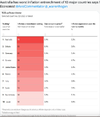- Joined
- 3 July 2009
- Posts
- 28,200
- Reactions
- 25,443
Well at least someone is stating the obvious, they need to break the positive feed back loop that is currently going on and the Government is the only one in a position to do it. But will they?
It is probably the first time the Feds have been in a position where they can change the GST, as it requires the consent of all States.

 www.smh.com.au
While that was more than 20 years ago, the introduction of the GST was the last major tax reform successfully introduced by any federal government. And that’s a problem.
www.smh.com.au
While that was more than 20 years ago, the introduction of the GST was the last major tax reform successfully introduced by any federal government. And that’s a problem.
As our population ages, Australia is going to need to spend more on increasingly expensive services such as health and aged care, while facing fewer people of working age to pay income tax – which happens to make up the greatest proportion of federal income.
The problem is one that all economists (who can never usually agree on anything) are in furious unison over: Australia needs tax reform.
Danielle Wood, who starts as head of the Productivity Commission today, said in a recent speech that Australia has a fiscal challenge.
Spending on the NDIS, increasingly costly medicines through the Medicare Benefits Schedule, aged care and defence are all forecast to grow at a rapid pace.
The government also relies heavily on income tax to fund these necessities. In this year’s federal budget, it expected individuals to pay more than $300 billion in income tax, more than half the government’s total tax revenue take (excluding GST, which gets handed straight back to the states).
This is a problem, said Wood in her Fairbairn lecture in Melbourne last month because,“We are asking future generations to bear the costs of today’s inaction.”
So why aren’t the major political parties talking about it?
Wood said that tax reform is not for the faint-hearted, as political scare campaign rumblings begin at the first whiff of it.
Loading
It is probably the first time the Feds have been in a position where they can change the GST, as it requires the consent of all States.
Higher GST? Negative gearing changes? Why we’ve got to talk about tax
Experts are in furious agreement: Australia needs tax reform. So why aren’t the major political parties talking about it?
As our population ages, Australia is going to need to spend more on increasingly expensive services such as health and aged care, while facing fewer people of working age to pay income tax – which happens to make up the greatest proportion of federal income.
The problem is one that all economists (who can never usually agree on anything) are in furious unison over: Australia needs tax reform.
Danielle Wood, who starts as head of the Productivity Commission today, said in a recent speech that Australia has a fiscal challenge.
Spending on the NDIS, increasingly costly medicines through the Medicare Benefits Schedule, aged care and defence are all forecast to grow at a rapid pace.
The government also relies heavily on income tax to fund these necessities. In this year’s federal budget, it expected individuals to pay more than $300 billion in income tax, more than half the government’s total tax revenue take (excluding GST, which gets handed straight back to the states).
This is a problem, said Wood in her Fairbairn lecture in Melbourne last month because,“We are asking future generations to bear the costs of today’s inaction.”
So why aren’t the major political parties talking about it?
Wood said that tax reform is not for the faint-hearted, as political scare campaign rumblings begin at the first whiff of it.
Loading



